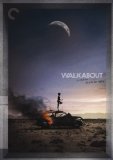| Reviews & Columns |
|
Reviews DVD TV on DVD Blu-ray 4K UHD International DVDs In Theaters Reviews by Studio Video Games Features Collector Series DVDs Easter Egg Database Interviews DVD Talk Radio Feature Articles Columns Anime Talk DVD Savant Horror DVDs The M.O.D. Squad Art House HD Talk Silent DVD
|
DVD Talk Forum |
|
|
| Resources |
|
DVD Price Search Customer Service #'s RCE Info Links |
|
Columns
|
|
|
Walkabout (Criterion Collection)

Walkabout adds up to much more than the sum of its parts. A road picture, a clash of cultures, a coming-of-age story - throwing these easy sub-genres around doesn't even begin to get at what the film is really about. It's about the development of minds in the context of their environment. It's about how communication between people and cultures either works or doesn't work - sometimes both at the same time, and for different reasons. It's about human beings as animals, capable of experiencing beauty, yet corrupted by their own need for artificial barriers.
Nicholas Roeg's film bears a simple plot about English children lost in the Australian outback, but the director enmeshes it with a host of cinematic devices - including photographic, editorial, and aural effects - building a thematic cocoon around the film that elevates it to that rarefied level at which one cannot imagine the story being told through any other medium. (I say this, despite the fact that Walkabout is loosely based on a novel of the same name by James Vance Marshall.)
From Sydney, Australia, an Englishman takes his two children on a picnic in the bush. As they lay out the spread, he shoots at them with a pistol before setting the car on fire and turning the gun on himself. Physically unharmed, the children escape, the teenage girl (Jenny Agutter) valiantly concealing the truth of what has happened from her much younger brother (Luc Roeg). After a few days spent wandering the outback, the two meet an Aboriginal boy (David Gulpilil), who joins them and, although ignorant of English, teaches them a few things about survival in the wild.
The trio's time together becomes a leisurely idyll, but as they draw closer to "civilized" parts of the country, their collective experience begins to fragment. The English siblings ultimately seek familiarity in the form of paved roads, prefab buildings, and automobiles; the Aboriginal boy becomes increasingly disturbed by their proximity to Western modernity. A rather innocent fixation on the white girl devolves into a dejected attitude and a protracted ritual dance. Although the English boy and the Aboriginal boy develop a rude form of communication using hand signals, the group's interaction is usually silent, and they suffer from an inability to delve into more complicated matters.
Although the plot is minimal, it's not exactly straightforward. A few key "unexplained" features of the story raise some interesting associations, principally the Englishman's suicide, which sets the main body of the film in motion. We know almost nothing of the Englishman, his job, or why he and his family have relocated to Australia. As to his suicide, the film seems to suggest that there was something about Australia that the Englishman could not handle - we see him striving to conduct himself as an urban Londoner might, clad in a bowler and drinking tea. Yet the picnic in the outback looks all wrong - a citified approach to desert dining is a juxtaposition that cannot succeed. In this oblique but effective way, we gain some understanding of the man's state of mind.
Beyond the main plot strand, there is a lot to consider. Walkabout's impressionistic style is jam-packed with all manner of storytelling signals. Roeg's use of cross-cutting alone (as when the Aborigine preparing to roast a kangaroo haunch is intercut with a butcher hacking apart chops in an antiseptic suburban shop) merits a closer look; this technique, which can be overbearingly flashy in the hands of a less judicious filmmaker, reinforces the relative alien-ness of differing ways of life. The aural experience of Walkabout is equally striking, with frothy amalgams of street sounds and animal screams sonically illustrating dueling horrors: aggressive city life versus nature's arbitrary judgments.
Confident, intuitive performances have been coaxed from the three juvenile leads; rarely has a film about children seemed so mature, complex, and, well, adult. Nudity abounds, in a way that is in harmony with the characters' increased comfort with their natural environment. Agutter and the younger Roeg behave like real siblings, relying on and supporting each other with small words and actions that reveal a deeper familial love. As the Aborigine, David Gulpilil acts his role in the local language, and even without the aid of subtitles, the performance has an assured beauty about it.
As it comes to an end, the viewer will note a tingling sense of poetic completion, as the film resolves its mysteries in a way that is well in keeping with its impressionistic narrative style. Instead of giving us expository information, the film somehow re-shapes its entirety through a few deceptively simple images. Throughout the film, but especially at the ending, there's something powerful and understated about the way Walkabout portrays Western society's intense dependence upon fantasy as a coping mechanism.
The DVD
The Video
Criterion has released Walkabout three times now - on laserdisc once, and on DVD twice. The image on this DVD is the best to date. The enhanced 1.78:1 picture is an exercise in deep, controlled contrast. The image is sharp, and very clean. Roeg's striking visuals, often lovingly composed, are rendered with a realistic, film-like texture. The transfer bears the sense of pride and polish we have come to expect from Criterion.
The Audio
The soundtrack has been given the same close attention as the image transfer. The mono track is well-balanced and free of telltale signs of age - hiss, pops, and the like. There are moments when the track seems a bit overly loud, but I would assume that these are intentional. For a mono track, it's one that is quite active; I wonder, with all the sonic activity in Walkabout, if Roeg wishes surround sound had been an option when he made it. As it stands, the mono track works well.
The Extras
On the first disc, Criterion has ported over the Commentary Track that previously appeared on the laserdisc and earlier DVD releases of Walkabout. The track features director Roeg and actress Jenny Agutter. Recorded separately, their candid remarks make for interesting listening.
The second disc begins with a new interview with Luc Roeg (20:50), the director's son, who played the young English boy. Now a well-established film producer, the younger Roeg has a number of perceptive things to say about the film and the experience of making it. Next is a new interview piece with Jenny Agutter (19:59), who speaks with great admiration of Nicholas Roeg and of the production process, which she remembers fondly.
The longest bonus is the feature-length documentary Gulpilil - One Red Blood (56:07), by Darlene Johnson. Made in 2002, it chronicles Gulpilil's career as an actor as well as his continued and unflagging participation in his native culture. It's a fascinating piece about a man who lives in one world while making a career in another.
Final Thoughts
Walkabout is impossible to forget. Its imagery clings to the mind. This is one of those movies that demands discussion; not only is it a compelling work of art, it is also a film that transcends - or refuses - the preconceived boundaries of its own medium. Highly recommended.
|
| Popular Reviews |
| Sponsored Links |
|
|
| Sponsored Links |
|
|
| Release List | Reviews | Shop | Newsletter | Forum | DVD Giveaways | Blu-Ray | Advertise |
|
Copyright 2024 DVDTalk.com All Rights Reserved. Legal Info, Privacy Policy, Terms of Use,
Manage Preferences,
Your Privacy Choices | |||||||














